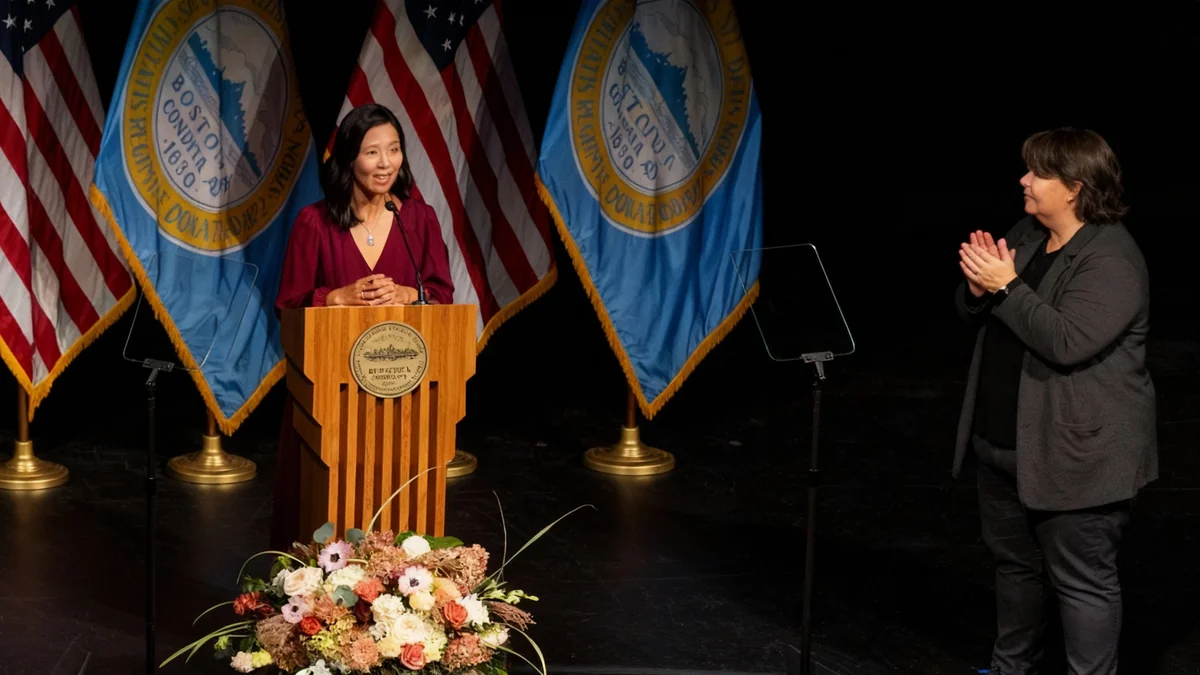Boston Mayor Michelle Wu is poised for a second term, backed by strong public support. However, her administration's policies on housing, taxes, and development have created a palpable sense of unease within the city's real estate and investment communities, who fear the new agenda could stifle growth.
While the mayor enjoys a 66% approval rating among the general electorate, a significant portion of the business sector expresses deep reservations. The friction stems from a series of progressive policies aimed at reshaping the city's economic landscape, leaving developers and investors weighing their future in Boston.
Key Takeaways
- Mayor Michelle Wu is expected to win re-election with strong public approval, but faces resistance from the real estate industry.
- Key policy disagreements include affordable housing mandates, green building standards, commercial tax rates, and rent control proposals.
- New housing permits in Boston have dropped by nearly 50% in 2025 compared to the same period in 2022.
- Despite the slowdown in permits, the mayor's office reports a record number of affordable housing units built or under construction during her term.
- External factors, such as federal funding cuts and a surplus of lab space, also contribute to the city's development slowdown.
A Tale of Two Constituencies
Mayor Wu's popularity with Boston residents stands in stark contrast to the sentiment within many of the city's boardrooms. Her focus on equity and affordability resonates with voters, but her methods have caused alarm for those who build and finance the city's growth.
This division was clear during the preliminary election, where Wu's rival, Josh Kraft, garnered substantial financial support from the real estate sector. Records show that leaders from major firms like Consigli Construction, Cushman & Wakefield, JLL, and City Realty provided maximum donations to the Kraft campaign. In contrast, while Wu also received support from some developers, the broader industry trend favored her opponent.
The concern is that policies designed to benefit residents could have unintended consequences for the city's economic competitiveness.
"When these things are pitched, we get calls from investors who can invest anywhere in the world. When they hear about these policies... it causes some real concern in the investment community."
- Tamara Small, CEO of NAIOP Massachusetts
The Policy Divide
The core of the disagreement lies in a set of ambitious proposals and regulations implemented during Wu's first term. For developers, these changes represent a cumulative financial burden that makes new projects increasingly difficult to justify.
Key Areas of Contention
The real estate industry has raised specific objections to several key policy areas:
- Affordable Housing: Increased requirements for developers of large projects to fund or include affordable housing units.
- Environmental Standards: Stricter, more costly green building codes aimed at reducing the city's carbon footprint.
- Tax Structure: Efforts to shift a greater share of the property tax burden from residential homeowners to commercial properties.
- Rent Control: The mayor's ongoing proposal to reintroduce rent stabilization, a measure that deeply concerns landlords and investors.
These policies, while individually aimed at specific social goals, are viewed by some as collectively creating an environment hostile to new investment. "More and more developers are simply not able to make it work in Boston," said Tamara Small, the chief executive of the industry group NAIOP Massachusetts.
Historical Precedent
Clashes between Boston's mayor and its development community are not new. Mayor Thomas Menino was known for having favorites, while his successor, Marty Walsh, significantly raised so-called linkage fees on commercial developers just before leaving office in 2021.
Housing Construction Hits a Snag
The most tangible sign of the slowdown is in housing construction. Data shows a sharp decline in the number of new homes being approved in the city.
Permits by the Numbers
In the first eight months of 2022, the city approved over 3,300 new housing units. During the same period this year, that number fell to fewer than 1,700.
This decline has been so significant that Boston is no longer the region's leader in new apartment construction. The industry website RentCafe reported in September that the neighboring city of Everett had approved more apartments this year than Boston.
However, the Wu administration presents a different perspective. A spokesperson for the mayor's office stated that the number of affordable housing units built or currently under construction during Wu's first term is higher than during any comparable period in the last 25 years. Initiatives like Welcome Home Boston, which uses $58 million in federal aid to build affordable homes on city-owned land, have been praised for supporting emerging developers and expanding homeownership.
External Pressures and a Broader Context
Not all of Boston's economic challenges can be attributed to City Hall. Harvard economist Edward Glaeser, who once had Wu as a student, noted that a range of external factors are at play.
These include drastic cuts in federal research funding to major institutions like Harvard Medical School and Massachusetts General Hospital, which are economic engines for the region. Furthermore, the city is still dealing with the aftermath of a speculative building boom that left millions of square feet of lab space empty.
"It’s unfair to blame any particular leader. It’s been a six-year process, not just in Boston, but across the region, of being able to build."
- Edward Glaeser, Harvard Economist
As Mayor Wu begins her second term, the central challenge will be balancing her progressive vision for an equitable city with the economic realities needed to fund and build that vision. The real estate community and international investors will be watching closely to see if a middle ground can be found to keep Boston growing.





